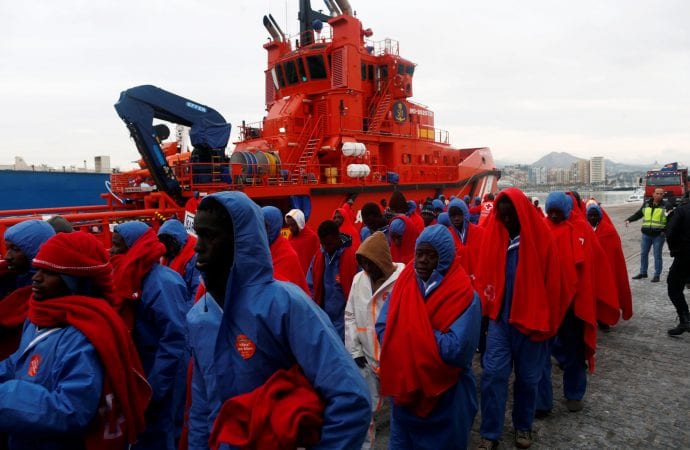Once a stronghold of European Catholicism, the Church is today at a crossroads in Spain, with a bishop being accused of being homophobic and Pope Francis being criticized by the guards who police the national border, who’ve told the pontiff, basically, enough with all the talk about “humanity.”
Pastoral outreach vs. conversion therapy
Last summer, Francis came under fire for saying that parents who believe their children have “homosexual tendencies” should take them to the psychiatrist. Though he toned down that rhetoric in a recent interview with a left-leaning Spanish journalist, a local Spanish bishop is currently being accused of “homophobia” for allegedly promoting “conversion therapies” intended to reorient gays to heterosexuality.
The diocese of Alcala de Henares, on the outskirts of Madrid, has been running courses for people with a same-sex orientation since 2009, when Juan Antonio Reig Pla was appointed as bishop. Though framed by a newspaper as conversion therapies, the diocese argues they’re part of a pastoral program of outreach and support to the LGBT community.
The regional government of Madrid announced last week that it would investigate the diocese to see if it had broken Spain’s anti-homophobia laws, after the online newspaper El Diario did a piece on the course with a journalist posing as a gay man trying to change his sexual orientation by attending the diocesan programs.
A therapist who leads the course allegedly told the undercover reporter to “stop consuming porn,” and that he needed to “govern his impulses.”
Promoting or carrying out conversion therapy is banned by law in the region of Madrid, and punishments include fines of up to $50,000.
In a statement on its website the diocese of Alcala de Henares called the report “fake news” and a “theatrical montage.” It also said that every person must be “respected and loved,” and that the diocese doesn’t say no to “welcoming and accompanying the people who freely ask [to be welcomed and accompanied].”
The statement closes with requests for prayers for “the freedom of the Church in Spain.”
In a video posted in the original report by El Diario, the person guiding the therapy is heard saying that she knows that under the current law in Madrid, what she’s doing is “illegal” and could put her in prison.
On Friday, the secretary general of Spain’s bishops’ conference, Bishop Luis Argüello, supported Reig Pla and said the news report was fueled by “hatred” and that it “manipulates the truth.”
In a press conference after a plenary assembly last week, Argüello defined as “disrespectful” the entrance of protesters into the cathedral of Alcala during Mass who had read about the alleged conversion therapies.
The bishops’ conference said the news reports are nothing but a “new exercise of manipulation of the truth and intentional disinformation that ends up provoking the ‘hatred’ it claims to want to avoid or denounce.”
He added that “homosexuality is not cured,” but said the Church “accompanies” those who are “uncomfortable” with their homosexuality.
“We defend the freedom of conscience of each person to face their different existential situations seeking help and accompaniment in the people and institutions that deserve their trust, among these, the Church,” said Argüello.
He also said that the accompaniment given to members of the LGBT community by the Church uses the word “healing,” not in a medical context but a spiritual one.
In addition, the secretary of the conference also underlined that the Spanish Constitution’s support for religious freedom, Spain’s Organic Law of Religious Freedom and international treaties on human rights to which Spain is a signatory all protect the Church’s right to offer its view of the human person and to welcome and accompany those who freely approach the institution to grow in an “integral human development” rooted in the Gospel and God’s merciful love.
Civil guards say they too have “humanity”
In the same interview with journalist Jordi Evole, the pontiff held one of the knife-like spikes placed atop fences the Spanish government has erected along the border with Morocco in Ceuta and Melilla.
“[These knives] show just how low can the humanity of a person go,” Francis said. “The lack of conscience is such that people seem to have become used to these practices.”
In response, Spain’s Asociación Española de Guardias Civiles, meaning the National Guard, which is responsible for policing those fences, said that “the civil guards have enough ‘humanity,’ as we’re the first ones to help any person when they’re at risk.”
Speaking with a local TV station, the guards said they too are against the so-called concertinas as long as other safety measures are in place.
“You cannot leave the borders without any sort of protection so that anyone can come in,” they said, adding that what the fences prevent isn’t “peaceful immigration” but illegal and violent entries, adding that “on a multitude of occasions the civil guards are attacked.”
“We have enough humanity, not only with immigrants, but with any person who’s at risk and in danger,” they repeated.

